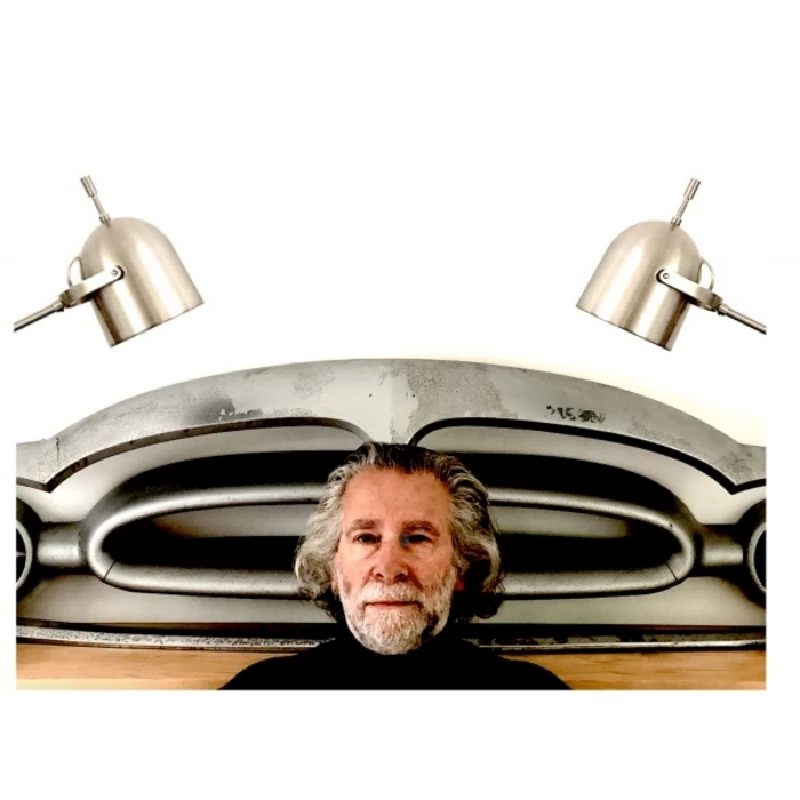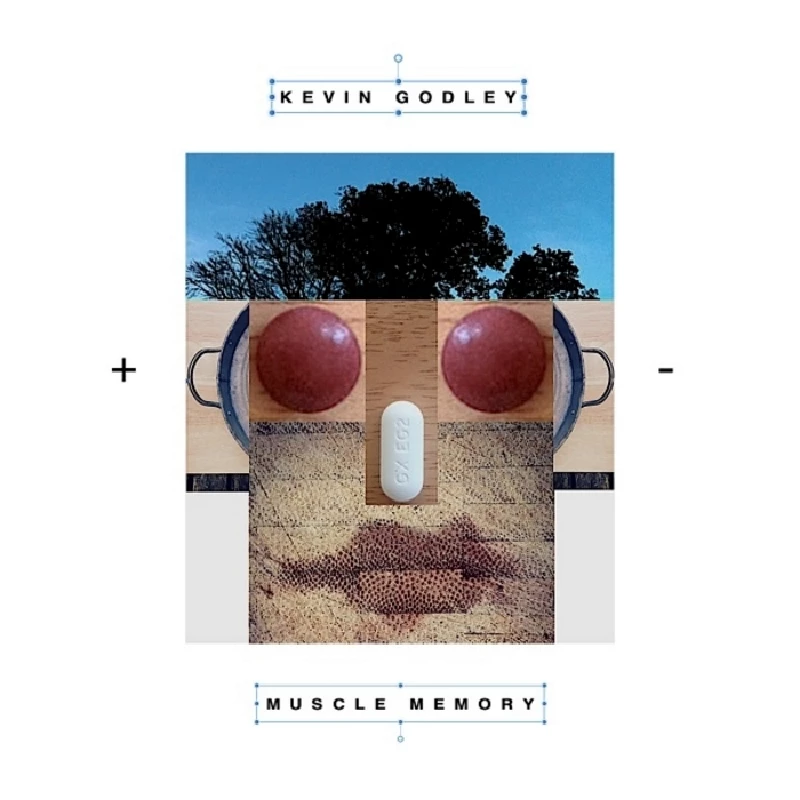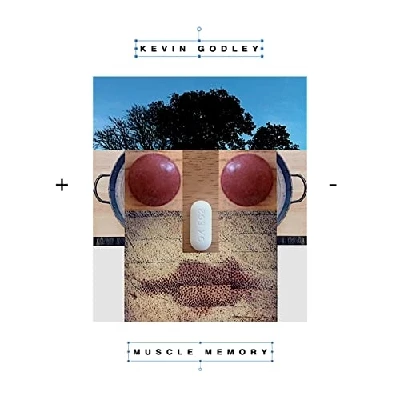Kevin Godley - Interview
by Lisa Torem
published: 29 / 10 / 2020

intro
10cc and Godley and Crème's Kevin Godley talks to Lisa Torem about his new interactive album project, ‘Muscle Memory,’ which asks pertinent questions about these unsettling times.
Kevin Godley is best-known as the drummer and vocalist for 10cc andhis musical partnership with Lol Crème in Godley and Crème. But his contributions to the industry extend far beyond those remarkable efforts. Drawing from his solid background in the visual arts after leaving Godley and Crème, Kevin began a second career as a video director. It led to multiple projects in the gaming industry and beyond and he is still much sought after. In his first pennyblackmusic interview, Kevin discusses what it was like putting together a post-Lennon Beatles project, the legacy of ‘I’m Not in Love,’ his views on collaboration and the one-off correspondence that inspired the production of ‘Muscle Memory.’ PB: ‘Muscle Memory’ (MM) came about in a unique way. You described it as “opening this collaborative door a lot wider.” How did this truly interactive project come about and how did you narrow down your selections to the eleven that appear? KG: There was a sort of random precedent. A couple of years before launching MM, I was emailed two pieces of instrumental music by a couple of totally unrelated musicians who I’d never met or even knew of. They were asking artists they liked to turn their tracks into songs, and I was one of them. I’d never worked this way before, but I tried it and found it liberating. It resembled the traditional writing partnership only in that someone else was playing music while I sang until it made sense. The big difference was that my collaborator had already recorded their parts, so there was no real-time to and fro, no bouncing ideas back and forth, just me reacting. In other words, I was left to my own devices to interpret their recordings melodically and lyrically. Then I’d demo the results and send them back to get comments. In both cases, I got a positive response, so I figured I was doing something right. Muscle Memory was exactly the same principle but I opened it up to include anyone, not just pro musicians, and got 286 tracks, which knocked me sideways. I chose the final 11 by trying to develop every track and whittled the numbers down according to which tracks stimulated something promising. It took ages I have to say, but it took me to some unusual and eye-opening places en route. PB: The lyrics and themes of ‘Muscle Memory’ contrast greatly from what we’ve heard from you in the past, with Godley & Crème and 10cc, certainly! Here you tackle racism, gun culture, white supremacy. KG: Lyrics are the thing that stamps you all over a song, regardless of who listens or actually hears them. At the time of writing, the world was changing so rapidly. I was troubled and confused by the number of elements pushing and pulling at each other. Almost without noticing everything had become fair game in terms of defining reality. Suddenly, the concept of truth was 100% subjective, so one was almost forced to choose sides. I couldn’t be that black and white about it, as the data kept changing so, lyrically, I didn’t tackle anything head-on. I came at things from the perspectives of 11 troubled and dysfunctional souls, dealing with their own problems while trying to navigate this moral grid-lock. I was pretty much asking questions instead of answering them, but I hope I made my own voice clear enough while speaking with theirs. PB: The musical styles vary greatly. Songs like the piano-driven ‘Hit the Street’ or Bullet holes in the Sky’ would sound right-at-home in a Broadway musical, but then ‘Cut to the Cat’ is otherworldly and hypnotic. How challenging was it to match lyrics to the different tracks? KG: It wasn’t too challenging as it’s enjoyable for me and I’ve learned to trust the process. If you’re hearing jazz, you sing jazz. If you’re hearing rock, you sing rock. Or you can be counterintuitive and push in opposite directions or create new ways to get there. Anything can work, but it’s important to say that it’s not, in any way, about thinking. The best things come when I’m letting the wheels spin, not staring at a blank page. It’s my DNA, not my brain that delivers the key, so after warbling garbage for days, a word or a phrase can, if I’m lucky, magically pop out of nowhere and just work. That’s the key and once I have that, I have a blueprint for the whole thing and the song begins to write me. PB: “Rows and rows of traumatized angels queuing for cigarettes / they wanted nothing more than to decorate paradise” is a compelling image. Can you share what inspired these thoughts? KG: The thought of a world devoid of all surprise and mystery, where every question has been answered, every belief picked apart and rationalised, every situation accounted for and defined and all art and self-expression is governed by law, economics, technology and social protocols. In other words, a world where we understand everything but feel nothing. PB: Another lyric that really struck home as we fare with this gruelling pandemic, is: “When they shut schools and the mob rules…” I think your candour is really what we need right now. This “new normal” has been confusing and I believe we need our artists more than ever to help us articulate what’s going on. Was it a difficult decision to break down barriers? KG: Thank you, but there was no decision making involved, as such. Ideas just came and if they sat well and felt strong enough they stayed. As there was no one there to censor what I said I took my foot off the brake and tried to be as open and as honest as possible. Anything less would’ve been a cop-out and a pointless exercise. PB: “One day there’ll be no new music” is from ‘One Day.’ Could this happen? How do you see the future in terms of publishing original works? KG: There’s definitely a ‘Black Mirror’ sensibility to all the MM lyrics but I’d hate to second guess the future too much. Who knew we’d be online 24/7 instead of flying cars and having sex with robots. However, it does seem that for every technological advance designed to make our lives better there’s an opposite reaction that makes things worse, publishing original works could potentially become a victim of that syndrome. As with anything, in the business side of music, it’s about you, the creator, wanting to achieve, how far you’re prepared to go, or are prepared to sacrifice to achieve it. Art versus commerce is a conundrum that may never go away, but if you’re smart enough you can discover or invent new ways to dovetail the two, or bypass them altogether. Hopefully something less worrying than the tech in this song. PB: You’ve directed videos for The Police, Garland Jeffreys, The Beatles and more. You directed ‘Real Love’ after John Lennon’s death and with George Harrison, Ringo Starr and Paul McCartney in attendance. What artistic choices did you make? KG: Well, the original brief was to make a documentary-style film using rarely seen archive footage but I couldn’t envisage any music film about the Beatles without some visual magic punctuating proceedings, so John’s iconic white piano rising out of the Mersey, the floating instruments plus Sgt. Pepper costumes and having all Threetles duplicating Yoko Ono’s super slo-mo film of John‘s face became the magic glue that held the reality together. PB: Given that your first love was art, is music as satisfying to you as a medium? KG: I try to make everything I do satisfying. I wouldn’t start a project if I couldn’t. It’s a funny thing, but in a way, it’s all the same stuff to me. Film, music, writing, designing, it’s all sculpting air in one way or another. Music is probably one of the most enjoyable though, because, unlike film, you don’t need a crew of people, a cast, a wardrobe, a set location or a shed load of camera equipment to make it happen. It’s all down to you and your taste buds. PB: You were with 10cc in the 1970s, left the band and rejoined in the 90s. In previous interviews, you suggest that you felt limited artistically at a certain point during that first incarnation. Staying in a band requires major compromise. What advice do you have for a band member that wants to stay in a successful band but also wants to spread his/her wings? KG: I didn’t exactly rejoin the band. I recorded a vocal on one song and I’ve contributed a few film clips to Graham Gouldman’s touring version of 10cc over the years and that’s it, but I can remember the frustations of being in a band. It’s a team mentality, so solo artistic freedom isn’t a given, you have to fight for it. That said, it’s almost inevitable at a certain stage in a band’s career, so a business model ideally shouldn’t just take care of business, it should take care of each member of the band and their creative needs. Also, compromise isn’t always that, sometimes it’s cookery. Too much of any ingredient in a dish can mess it up and your 20-minute synth solo in the middle of a sensitive ballad may be the mess. In other words, a band is about the bigger picture, not you. But the bigger picture can benefit by giving each member the time and opportunity to discover and expand their own talents so they can grow and bring that experience back to the table. It’s the polar opposite of what happened to 10cc of course, but we didn’t know any better in the 70s. PB: ‘I’m Not in Love’ continues to enjoy huge international success. What was the magic potion? Was it technically ahead of its time? Was it that we all relate to fear of rejection? KG: The magic potion was the commitment to an idea and seeing it through. Although it wasn’t really technically ahead of its time, it was about reverse-engineering the technical limitations of the day. As in hearing a sound in your head and figuring out how to make it, using vintage analogue tools. It took weeks to get us to the place where the magic could actually happen for real, but once it did it didn’t stop. Also, the song was good and, as you suggest, may well have tapped into everyone’s fear of rejection, but it needed framing properly so that emotional connection could shine. It just took longer to build the frame than to record the song. PB: In terms of songwriting collaborations, what traits are most desirable? KG: Patience, lack of fear about making a fool of yourself, an inquiring mind, as few interruptions as possible, shared musical tastes, working with someone you like as opposed to despise, having a vague idea about what you want the song to achieve or, in truth, none of the above. Songwriting isn’t an exact science so anything can happen, anywhere, under any circumstances. You just have to be open to it. PB: What projects are coming up next for you? KG: Other than promoting ‘Muscle Memory,’ I’m co-writing a podcast drama, hoping, post-COVID, to go into pre-production to direct ‘The Gate,’ my screenplay about Orson Welles’ time in Ireland in 1931, conceiving video games and AR / VR projects, designing screen content for two musical theatre shows, planning an art exhibition and considering making a lot more music. Busy, busy, busy. PB: Thank you.
Band Links:-
http://www.kevin-godley.com/https://twitter.com/kevingodley9
https://en.wikipedia.org/wiki/Kevin_Godley
Have a Listen:-
Picture Gallery:-


reviews |
|
Muscle Memory (2020) |

|
| Singer/musician/producer Kevin Godley’s new album creates original lyrics and music against instrumental tracks sent in by fans. |
most viewed articles
current edition
Carl Ewens - David Bowie 1964 to 1982 On Track: Every Album, Every SongArmory Show - Interview with Richard Jobson
John McKay - Interview
Colin Blunstone - Thalia Hall, Chicago, 16/7/2025
Billie Eilish - O2 Arena, London, 10/7/2025
Bathers - Photoscapes 1
Visor Fest - Valencia, Spain, 26/9/2025...27/9/2025
Loft - Interview
Sir Tim Rice - Interview
Robert Forster - Interview
previous editions
Manic Street Preachers - (Gig of a Lifetime) Millennium Stadium, Cardiff, December 1999Heavenly - P.U.N.K. Girl EP
Beautiful South - Ten Songs That Made Me Love...
Oasis - Oasis, Earl's Court, London, 1995
Peter Perrett - In Dreams Begin Responsibilities Interview Part One
Prolapse - Interview
Coldplay - Wembley Arena. London, 16/8/2022
Boomtown Rats - Ten Songs That Made Me Love....
Trudie Myerscough-Harris - Interview
Pixies - Ten Songs That Made Me Love...
most viewed reviews
current edition
Davey Woodward - Mumbo in the JumboSick Man of Europe - The Sick Man of Europe
Lucy Spraggan - Other Sides of the Moon
Phew, Erika Kobayashi,, Dieter Moebius - Radium Girls
Amy Macdonald - Is This What You've Been Waiting For?
Bush - I Beat Loneliness
Suzanne Vega - Flying With Angels
Alice Cooper - The Revenge of Alice Cooper
Blueboy - 2
Cynthia Erivo - I Forgive You
Pennyblackmusic Regular Contributors
Adrian Janes
Amanda J. Window
Andrew Twambley
Anthony Dhanendran
Benjamin Howarth
Cila Warncke
Daniel Cressey
Darren Aston
Dastardly
Dave Goodwin
Denzil Watson
Dominic B. Simpson
Eoghan Lyng
Fiona Hutchings
Harry Sherriff
Helen Tipping
Jamie Rowland
John Clarkson
Julie Cruickshank
Kimberly Bright
Lisa Torem
Maarten Schiethart